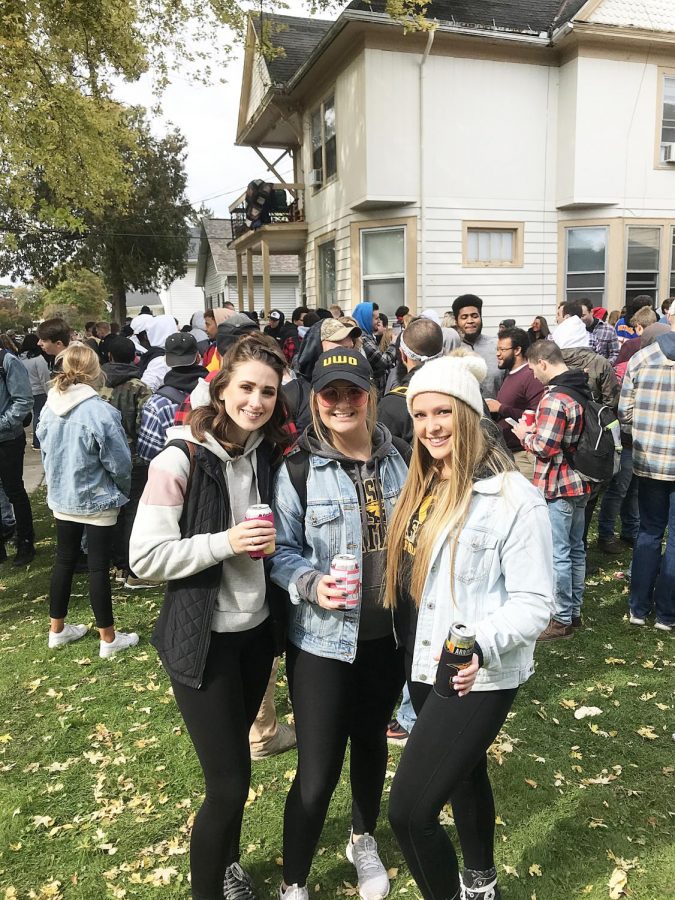Politics.
We love to hate it and hate to love it. People like to spice up any conversation with a dash of “I hate Hillary Clinton” here and a sprinkle of “Donald Trump is trash” there. Let’s just admit it: the 2016 Election was like that juicy soap opera that you know is horrible to watch yet is so bad that it’s good. What’s particularly special about this election was that it was laced with scandals and mystery around every corner. “This is how politics works,” people would say.
While we just witnessed one of the most controversial elections in history, this is echoed in the most recent situations with the OSA elections. While the news writers of the Advance-Titan can tell you what happened with the election, I can tell you what happened within the election.
I’d like to start off by saying I went into this election thinking it was going to be like high school student government, since I was a part of that. The candidates ran campaigns with posters and cheesy slogans, and the students usually voted for whoever they liked the most. That’s politics.
Yet here I was, a journalism and international studies major, running for VP of OSA. I guess the one thing I can say Donald Trump and I have in common is we were not qualified for this whatsoever; I only knew politics from my CNN app, my scrolls through VICE’s website, clicks on Fox News and whatever Facebook had to spit out at me. But I still believed in myself enough to think I could possibly help the student population.
Since taking my national security class this previous fall, one thing I remember from reading all 32 pages of the U.S. National Security Strategy is that young people are the future, so it’s up to us now to start influencing the next generations. I wanted to advocate that through this election. Instead, it was basically every candidate repeating the same mantra of whatever the students wanted to hear just to get their vote. That’s politics.
When I came back from spring break, all the candidates had to go to a meeting to discuss allegations and whatnot. I didn’t attend because I had class. Unfortunately, college algebra made me miss the juicy results of this election.
First, it was finding out Aaron and I lost. I felt very indifferent about it. Aaron would go back to working as Winnebago County Board Supervisor and I would continue being Hailey Lawrence, regular college student. Second, it was seeing the other slates express their concern about the results. To say I was confused is an understatement. I saw my friend and fellow candidate, Bryan Carter, share a post from his campaign stating how the penalties did not add up correctly. After reading the whole post, it became evident to me that there was a lot wrong with this election. This is where that college algebra class comes in.
In a campus of roughly 14,000 students, 768 people voted. That’s 0.05 percent of the whole campus population. The final results of the election are as follows: Colligan/Carter got 294 votes, Berge/Schadrie got 188, Wojciechowski/Lawrence got 144 and Obieze/Veith got 139.
Each candidate would respectfully get a certain percentage of their votes deducted for certain violations, such as campaigning after the election (fancy talk for leaving your posters up after the election is done) and other violations. Colligan/Carter would get 26 percent of their vote deducted, Wojciechowski/Lawrence would get 15 percent of their vote deducted, Obieze/Veith would get 21 percent of their vote deducted and Berge/Schadrie would get 20 percent of their vote deducted.
You would think that you would take the final vote totals and do some multiplication and subtraction and get your final vote totals. Instead, the math, no matter how many times and how many math magicians I asked to assist me, did not add up. How Obieze/Veith got a negative amount of vote totals, I have no idea. It is like 22 voters just disappeared without a trace.
The missing 22 voters is one of Carter’s arguments with advocating against this final count. His claim is he is “against the impromptu and unprecedented interpretation of the OSA penalty system by the election commission.” Carter also won the popular vote by over a hundred, which is also in his argument. Carter holds a strong case, and I think, along with his interests, he is also thinking of his other opponents. He informed me that he spoke about this whole fiasco on Tuesday to the OSA Senate to not approve the final results of the election.
Carter has a strong following and an even stronger voice, the true embodiment of a politician. But in the end, it is in the hands of the Senate to approve of this. On Monday, Carter spoke in front of the Student Assembly and informed me his efforts to change the results of the election had come to an end.
As for Maria Berge and her campaign, I support her becoming president. She has the experience and the leadership qualities to represent the entire student body. I couldn’t imagine what it’s like to be in this situation where you won but others are arguing that victory. While the others are fighting this, Berge remains silent, as her campaign Facebook page doesn’t mention anything in regards to it. With Carter giving up on his efforts to change the results of the election, Berge officially has the peace of mind knowing she truly and fully won the election.
Upon reading back on emails I’ve received in regards to the results of the election, it is said “the number of votes after a percentage of the total vote (768) for allegations is removed.” It was said in print how they were going to deduct the percentage. Maybe there was a miscommunication, or maybe the math really did not add up.
Maybe there was so much hostility that one slate won the popular vote but did not win the whole election. Maybe the fault is in the OSA bylaws. Everyone is entitled to their own opinion, which is something I think people fail to realize.
I think there is a lot that needs to be fixed in all areas of any political spectrum. I think everyone– Democrat, Republican, Independent and so on– can agree politics is a messy game and everyone somehow thinks they can fix it by themselves. Truth is, nothing is ever truly perfect, but instead it is a collaborative effort to make things better. I think that is the real gist of what politics actually is.
If you have been analyzing this as much as I have, this election definitely is a reflection of the recent United States presidential election. You have an opponent who won the popular vote but didn’t win the election; you had the electoral college (the Commission Committee) determine the final verdict of the election; and then you have a whole body of people argue against the presidency with social media hashtags and whatnot. While we don’t have anything as extreme as #NotMyPresident, we have Carter’s hashtag, which is #DoTheMath. In the end, we all have to agree on one thing: this is politics.
The fact of the matter is, as I mentioned before, politics is messy. I learned a lot as a person with no political experience besides making campaign poster in high school.
If anything, I learned skills that would help me improve as a journalist. I got the dirt, and I was able to reinterpret it through multiple different opinions and perspectives. Additionally, I have a newfound respect for those who are in OSA, as they go through a lot to represent our campus community in many unknown ways.
With that, my final thoughts on the results of this election aren’t reflective of the numbers but with the system itself. OSA prepares young politicians like Wojciechowski, Colligan and Carter for the raw tension of actual elections. It’ll reveal to you the unseen efforts the OSA does for average students like you and me.
It also shows that outside student political involvement is lacking with less than 10 percent of the student population actually voting. It shows the lack of political awareness and involvement in most young adults. This generation can educate themselves on policies and political agendas so they can be aware; OSA can be a simple start to that awareness.
For now, I congratulate Maria Berge on her victory, Bryan Carter for running a great campaign and revealing the faulty interpretation of the voting bylaws, Aaron Wojciechowski for being a great mentor for my political knowledge and for continuing his position as the youngest elected official in Wisconsin and Goodwill Obieze for also running a great campaign.
While this was a fun ride, I will happily return to being a journalist. I can definitely confirm through this experience that the future of the campus community, both elected officials and active students, will be in good hands.












